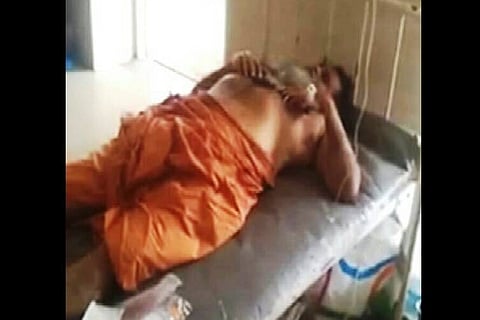

On Saturday, a shocking incident from Kerala came to light. A young law student from Kerala informed the police that she chopped off the penis of a godman named Sreehari alias Ganeshananda Theerthapada Swami from a Kollam ashram, following years of alleged sexual abuse and rape. Many reactions to the incident, including CM Pinarayi Vijayan’s, were supportive of the woman’s act.
The police told TNM that she resorted to the violent act out of fear and frustration, because she didn’t think anyone would believe her if she claimed a ‘man of god’ had been raping her for years.
But regardless of the empathy her situation may rouse among many, she will be tried in the court of law as a criminal too. In such a scenario, does she - and other women who resort to violence after years of abuse - stand a chance of justifying their actions?
According to Valsamma, practicing advocate in the Kerala High Court, the woman here can plead for the right to private defense under Section 100 of the Indian Penal Code.
The section essentially says that the right to private defense allows voluntary harm or causing of death to an assailant if the latter attempts an assault which “may reasonably cause the apprehension” of death or grievous injury. The right also extends to an assault with the intent of committing rape and “gratifying unnatural lust” among other things.
Sudha Ramalingam, senior advocate at the Madras High Court, agrees. Sudha also emphasises on the need to look at the woman’s case with empathy. “It is something that she would have done in anger and we need to empathise with the victim. The gruesomeness of the act is only because she has been harassed for long years," she told TNM.
Drawing from Sudha’s insistence of empathy for the years of alleged assault and rape, it is important to note a condition called the ‘Battered Women’s Syndrome’ or BWS. Coined in 1984 by Lenore Walker, a psychologist who researched on domestic violence, BWS is characterised by some psychological and behavioral symptoms which are found in women subjected to prolonged intimate partner violence.
BWS is premised on a ‘cycle of violence’ which induces ‘learned helplessness’ in women. The latter, Walker explains, is a situation where after each battering, the woman’s motivation to respond is diminished. This further leads her to believe that these attempts are futile and that the battering and violence is somehow deserved.
‘Learned helplessness’ therefore, is where a woman comes to believe that she cannot escape from the terrifying cycle. BWS jurisprudence takes into account the victimised woman’s psychological state where she believed that violence was the only way to escape the abuse she was being subjected to.
According to advocate Shalu Nigam’s article on concurrents.org, in countries like Canada, Australia, New Zealand, UK and USA, the BWS doctrine has gained legitimacy in psychological as well as legal spheres to defend battered women who have killed the perpetrators of abuse, even in non-confrontational situations. Using the BWS doctrine does away with the ‘immediacy’ clause, meaning that the woman doesn’t have to be in immediate confrontation or danger of assault.
In the context of an Indian woman, BWS has been applied in the case of Kiranjit Ahluwalia, who moved to the UK after marriage. Kiranjit, whose story also inspired the Aishwarya Rai-starrer Provoked, killed her husband in 1989 by setting the bed in which slept, on fire. She had suffered a decade of domestic abuse, which she said led her to take the extreme step.
Sentenced to life in 1989, her case came for appeal in 1992 again. It was argued that the judge should have directed the jury to consider that an educated and reasonable person was suffering from BWS when she killed her husband. When the court considered medical evidence then, it was found that Kiranjit was suffering from severe depression at the time too.
In India however, the doctrine has not been used much until as recently as 2016. The Delhi High Court, in a landmark ruling, had held a man guilty of abetting the suicide of his wife. In the case of State v Hari Prashad, the court took cognizance of the fact that Hari Prashad had been mentally and physically torturing his wife, Pushpa, and also harassed her for not bringing enough dowry.
“Like a parasite the negative thoughts, propelled by the brutality and bestiality inflicted by Hari Prashad grew inside her mind leaving the outer appearance wholesome, it tore her mind and enslaved it in an iron mesh. Faced with the prospect of repeated physical and psychological torture and the risk of certainty of serious injury, the battered Pushpa had two options. To kill Hari Prashad or to kill herself. She chose the latter because she could not indulge in a mutual combat with Hari Prashad,” reads an excerpt from the judgement, which also mentions BWS.
It remains to be seen whether BWS can be used to defend the actions of the Kerala woman. However, if she is found guilty under section 326 of the IPC (Voluntarily causing grievous hurt by dangerous weapons or means), says advocate Valsamma, she stands to be awarded a sentence of a decade to life imprisonment.
(Inputs from Pheba Mathew)